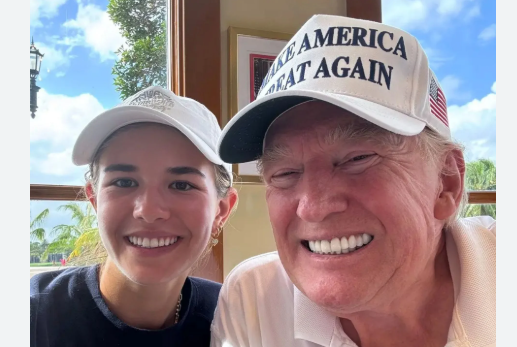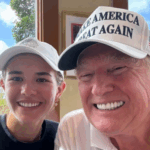The intersection of family life and public office has always presented unique challenges for American presidents, who must navigate the delicate balance between personal relationships and public perception. Recently, a family gift has captured national attention, sparking conversations that extend far beyond typical discussions of presidential family dynamics. The story of this particular present illuminates broader questions about wealth, family relationships, and the symbolic weight that presidential actions carry, even in the most personal moments.
What began as a private family gesture has evolved into a fascinating case study of how presidential families navigate the complex terrain of public scrutiny while maintaining normal familial bonds. The gift in question represents more than a simple grandfather-granddaughter exchange; it has become a lens through which Americans examine their own values about family, wealth, and the responsibilities that come with high office.
The Granddaughter at the Center of Attention
Kai Trump, the granddaughter who received this attention-grabbing gift, represents a new generation of the Trump family coming of age in the unique environment of presidential prominence. As a 17-year-old student at the University of Miami, she has already demonstrated remarkable poise in navigating the complexities of being part of one of America’s most scrutinized political families.
Her talents extend well beyond managing public attention – Kai has established herself as a skilled golfer, representing her university and pursuing excellence in a sport that has long been associated with her grandfather’s interests and business ventures. This shared passion for golf has created a special bond between grandfather and granddaughter, providing them with common ground that transcends the often-intense world of politics.
The relationship between Kai and her grandfather appears to be genuinely close, characterized by warmth and mutual admiration that has been evident in their public interactions. She has frequently shared intimate family moments on social media, offering the public glimpses into the more personal side of the Trump family dynamic while consistently expressing gratitude for her grandfather’s influence and support in her life.
This close relationship has provided the foundation for the kind of generous gesture that has now captured public attention, demonstrating how family bonds can remain strong even under the intense scrutiny that comes with presidential office. Kai’s comfort in sharing these family moments publicly suggests a confidence and maturity that serves her well in navigating the unique challenges of her position.
The Gift That Sparked Conversation
The revelation of the specific gift – a Tesla Cybertruck valued between $81,985 and $101,985 – immediately captured public attention for multiple reasons. The substantial cost alone places this present in a category that few American families could consider for a teenage recipient, highlighting the significant wealth disparities that exist in American society and raising questions about appropriate gift-giving for young people.
The choice of a Cybertruck, Tesla’s futuristic and polarizing electric pickup truck, added additional layers of interest and controversy to the story. This vehicle represents cutting-edge automotive technology and environmental consciousness, while also carrying a price tag that places it firmly in the luxury vehicle category. The selection of such a distinctive and expensive vehicle for a teenager naturally prompted discussions about responsibility, privilege, and the messages that expensive gifts might send.
The timing of the gift, given approximately a year ago according to reports, suggests that this was not an impulsive purchase but rather a considered decision made well before it became a subject of public discussion. This timing also indicates that Kai has had substantial experience with the vehicle, allowing her to demonstrate her appreciation and responsibility in handling such a valuable gift.
The public revelation of the gift’s cost has transformed what was likely intended as a private family gesture into a broader conversation about wealth, family relationships, and the symbolic significance of presidential family spending decisions. The specific disclosure of the price range adds a level of transparency that is unusual for private family matters but reflects the unique scrutiny faced by presidential families.
Public Reactions and Social Media Response
The disclosure of this expensive gift has generated a wide spectrum of reactions across social media platforms and public forums, reflecting the deep divisions that often characterize discussions involving prominent political figures. The responses have ranged from admiration for a grandfather’s generosity to criticism about the appropriateness of such an expensive gift for a teenager.
Supporters of the gift have emphasized the positive aspects of a grandfather’s desire to provide for his granddaughter and have noted that the family’s financial means make such generosity possible without creating financial hardship. Many have pointed out that family gift-giving decisions are typically private matters that shouldn’t be subject to public judgment, regardless of the amounts involved.
Critics have raised questions about the message such expensive gifts might send about values and responsibility, particularly when given to young people. Some have expressed concern about the potential for such gifts to create unrealistic expectations or to disconnect young recipients from the financial realities faced by most American families.
The social media response has also reflected broader political divisions, with some using the gift as an opportunity to criticize presidential family spending patterns while others have defended the family’s right to make private financial decisions without public interference. These polarized reactions demonstrate how even personal family matters can become politicized in the current media environment.
The Tesla Connection and Business Implications
The choice of a Tesla vehicle for this high-profile gift carries additional significance due to the complex relationship between the Trump administration and Tesla CEO Elon Musk. This selection appears to align with the president’s public expressions of support for Tesla and Musk’s various business ventures, creating an interesting intersection between personal gift-giving decisions and public policy positions.
Tesla’s position as a leader in electric vehicle technology and sustainable transportation aligns with various policy initiatives and technological advancement goals that have been part of the current administration’s agenda. The choice to purchase a Tesla product as a family gift could be interpreted as a personal endorsement of these technological and environmental priorities.
The Cybertruck itself represents Tesla’s ambitious attempt to revolutionize the pickup truck market through innovative design and electric powertrain technology. By choosing this particular vehicle, the gift demonstrates confidence in American automotive innovation and emerging technologies, potentially sending subtle messages about technological leadership and environmental responsibility.
The timing of this gift also coincides with Tesla’s broader efforts to expand its market presence and establish the Cybertruck as a viable alternative to traditional pickup trucks. While the gift was clearly a personal family decision, its public revelation may inadvertently provide additional visibility for Tesla’s newest and most distinctive vehicle offering.
Educational and Personal Development Context
Kai’s status as a university student pursuing her education while managing the unique challenges of her family’s prominence adds important context to discussions about this expensive gift. The responsibility of owning and maintaining such a valuable vehicle could potentially serve as a learning experience about financial responsibility and the maintenance requirements of sophisticated technology.
Her involvement in competitive golf at the university level demonstrates a commitment to excellence and discipline that suggests maturity in handling responsibilities. The combination of academic pursuits and athletic competition requires significant time management skills and personal responsibility, qualities that may extend to her handling of valuable possessions like the Cybertruck.
The gift also provides practical benefits for a college student, offering reliable transportation that supports her educational and athletic commitments. The vehicle’s advanced safety features and technology may provide additional peace of mind for family members concerned about her safety and security while traveling to various commitments and activities.
The experience of owning such a distinctive vehicle may also provide valuable lessons about public attention and responsibility, as the Cybertruck’s unique appearance naturally draws attention wherever it appears. This experience could prove valuable preparation for continued life in the public eye as a member of a prominent political family.
Family Dynamics and Generational Wealth
The gift illuminates broader questions about how wealthy families navigate generational wealth transfer and the values they seek to instill in younger family members. The decision to provide such an expensive gift reflects both the family’s financial capacity and their approach to supporting younger generation members in their pursuits and interests.
Generational wealth creates unique opportunities and challenges for families, requiring careful consideration of how to provide support and opportunities without undermining the development of personal responsibility and work ethic. The choice to give such a significant gift to a college-age family member suggests confidence in the recipient’s maturity and ability to handle the associated responsibilities appropriately.
The public nature of this gift also highlights the additional complexity faced by wealthy political families, whose private financial decisions inevitably become subjects of public discussion and analysis. This scrutiny adds pressure to family decision-making processes that most families never experience, requiring careful consideration of both family interests and public perceptions.
The relationship between Kai and her grandfather appears to be built on genuine affection and shared interests rather than simply financial support, suggesting that expensive gifts are part of a broader pattern of family engagement and support rather than substitutes for personal attention and involvement.
Cultural and Societal Implications
The public discussion surrounding this gift reflects broader American conversations about wealth inequality, family values, and the responsibilities that come with financial success. The stark contrast between the cost of this gift and the financial realities faced by most American families inevitably prompts discussions about fairness and social responsibility.
These conversations often reveal different philosophical approaches to wealth and family responsibility, with some viewing generous gift-giving as a natural expression of family success while others see potential problems with disconnecting young people from typical financial realities through expensive presents.
The cultural significance of automobiles in American society adds another layer to these discussions, as vehicles often serve as important symbols of independence, responsibility, and personal identity. The choice of such an expensive and distinctive vehicle for a teenage recipient carries additional symbolic weight in a culture that places significant meaning on automotive choices.
The environmental implications of choosing an electric vehicle also connect to broader societal discussions about sustainability and technological advancement, potentially positioning the gift within larger conversations about environmental responsibility and innovation adoption.
Media Coverage and Public Interest
The level of media attention devoted to this family gift demonstrates the intense public interest in presidential family dynamics and the challenges faced by political families in maintaining privacy while serving in highly visible roles. The coverage reflects the public’s fascination with the personal lives of political figures and their families.
The detailed reporting on the gift’s cost and specifications illustrates how modern media coverage extends into previously private family matters, creating new challenges for political families seeking to maintain normal family relationships while serving in public office. This level of scrutiny represents a significant departure from historical norms regarding presidential family privacy.
The social media amplification of this story demonstrates how family matters can quickly become national conversations in the current media environment, with personal decisions becoming subjects of widespread public debate and analysis. This dynamic creates additional pressure on political families to consider public reactions even in their most personal decisions.
The sustained interest in this story also reflects the public’s ongoing fascination with wealth and lifestyle choices of prominent figures, demonstrating how personal spending decisions can become windows into broader discussions about values and priorities.
Privacy Considerations and Family Life
The public discussion of this private family gift raises important questions about the appropriate boundaries between public interest and family privacy, particularly regarding the treatment of younger family members who did not choose to enter public life themselves. Kai’s status as a college student pursuing her own interests and goals adds complexity to discussions about appropriate levels of public scrutiny.
The balance between transparency and privacy becomes particularly challenging when family financial decisions become subjects of public interest, as political families must navigate between legitimate public curiosity and their right to maintain private family relationships and decision-making processes.
The long-term implications of such public scrutiny on young family members represent an important consideration for political families, as extensive media attention during formative years can create lasting impacts on personal development and future opportunities.
The precedent set by coverage of family gift-giving decisions may influence how future political families approach private family matters, potentially creating additional considerations and constraints on normal family interactions and expressions of affection.
Economic and Market Perspectives
The purchase of such an expensive vehicle also provides insights into luxury automotive market dynamics and consumer behavior among high-net-worth individuals. The Tesla Cybertruck’s position in the luxury electric vehicle market makes it an interesting case study in how emerging technologies penetrate affluent consumer segments.
The price point of this gift places it within the luxury goods category that serves as an economic indicator of spending patterns among wealthy Americans. The willingness to make such purchases for family gifts may reflect broader confidence in economic conditions and personal financial security.
The choice of an American-manufactured electric vehicle also carries economic implications related to domestic manufacturing support and emerging technology adoption. The purchase supports American automotive innovation and manufacturing jobs while demonstrating confidence in domestic technological capabilities.
The public revelation of this purchase may influence other potential Tesla customers, either positively through product endorsement or negatively through associations with controversial figures, demonstrating how high-profile purchases can have broader market implications.
Future Implications and Lessons
The ongoing discussion surrounding this gift may influence how future political families approach private financial decisions and gift-giving, potentially creating additional considerations about public reactions and media coverage in what were previously purely personal family matters.
The experience may also provide valuable lessons for Kai herself about managing public attention and the responsibilities that come with prominent family membership, potentially preparing her for continued public interest in her activities and decisions throughout her life.
The broader conversation prompted by this gift may contribute to ongoing societal discussions about wealth inequality, family values, and the appropriate use of financial resources, potentially influencing public policy discussions and social attitudes toward wealth and responsibility.
The precedent established by the level of scrutiny applied to this family gift may affect future coverage of political family activities, potentially expanding or constraining the scope of public interest in private family matters.
Conclusion: Family Life in the Public Eye
The story of this expensive family gift ultimately illustrates the unique challenges faced by political families in maintaining normal family relationships while serving in highly visible public roles. The tension between personal family dynamics and public scrutiny creates complex considerations that most families never experience.
While the cost and nature of the gift have prompted legitimate discussions about values and responsibility, the underlying story appears to be one of family affection and support between a grandfather and granddaughter who share common interests and genuine mutual admiration. The public attention directed toward this private family matter demonstrates both the intense interest in political family dynamics and the challenges of maintaining family privacy in the modern media environment.
The broader conversations prompted by this gift reveal important societal tensions about wealth, family responsibility, and public accountability that extend far beyond any single family or political figure. These discussions reflect ongoing American debates about inequality, values, and the responsibilities that accompany success and prominence.
As political families continue to navigate the complex terrain of public service and private family life, the lessons learned from situations like this may help inform future approaches to balancing family relationships with public responsibilities, ultimately contributing to a better understanding of the human dimensions of political leadership and public service.










